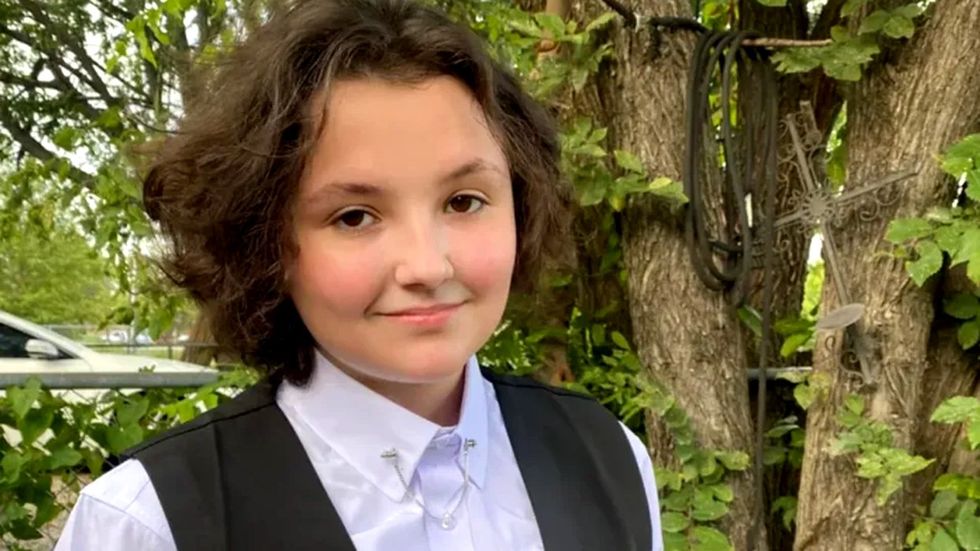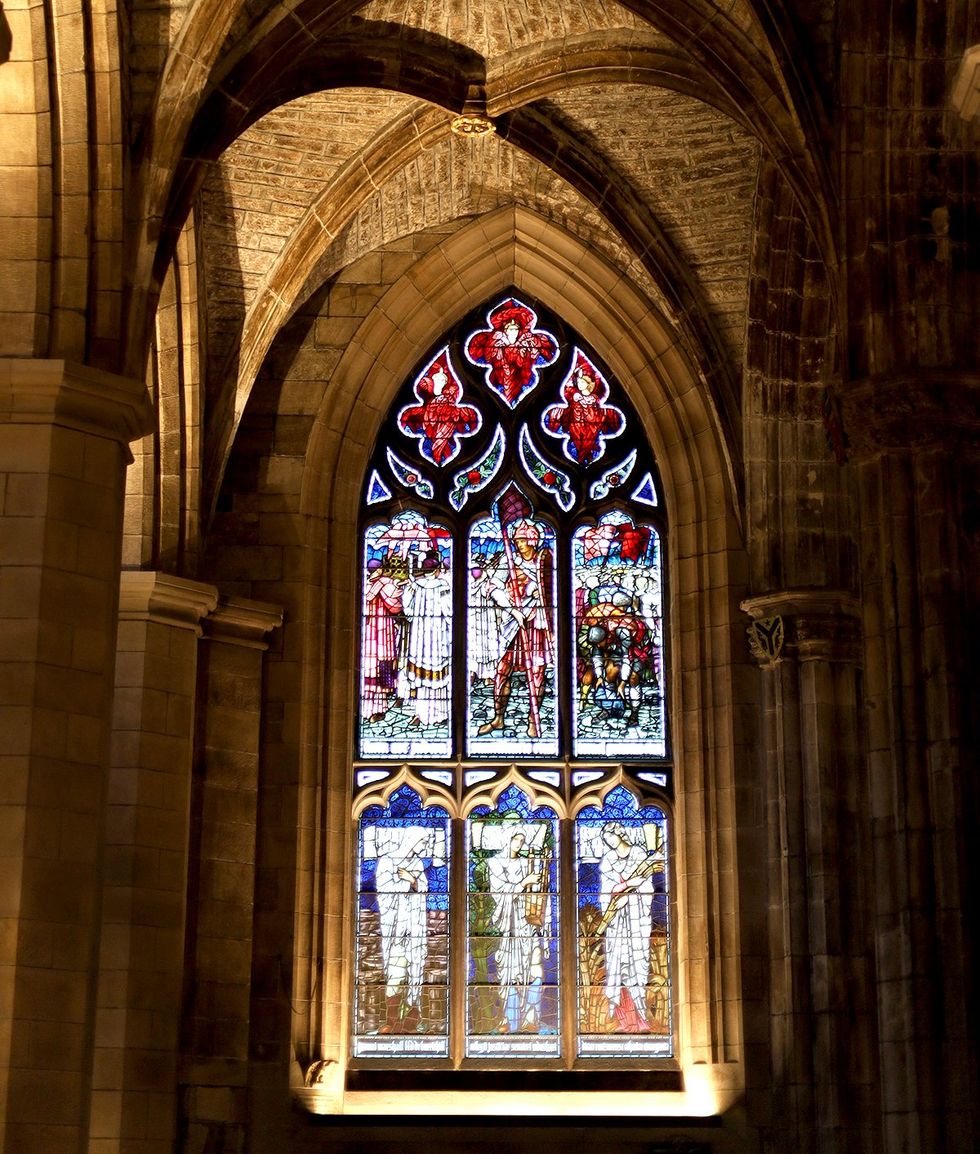I was listening to NPR, watching my kids swim in the bay, their shining heads bobbing in the light-studded water when I heard the news about the tragic death of Nex Benedict. I felt grief and a sadly familiar hand of fear pressing down on my chest.
I searched the Internet to see if it related to religion, and it did, but not in the way I expected.
I feared that, like me and most queer people I know, Nex was raised in a religious home and made to feel shame about who they were. What I found instead was, in the wake of their death, the state’s anti-trans and anti-queer legislation was under scrutiny, and among the laws targeting queer kids is one that prohibits discrimination against religious organizations that adopt and enact anti-queer policies.
 Courtesy Kasandra Phelps via GoFundMe
Courtesy Kasandra Phelps via GoFundMe
It’s like the seven degrees of separation game. Still, with religion — where you find one of us dead, you won’t have to look far to find a connection to religion. Specifically, a religion that finds something unnatural and wrong about perfectly natural things. However, these organizations have claimed the right to define morality for all of us. And they want the law to protect them in that claim.
This idea that an organization is being mistreated if it is asked not to discriminate against people is near the heart of a phenomenon known as religious trauma. The term was coined in 2011 when a psychologist, Marlene Winell, used it to describe what happens to people who are raised in religious environments that cause them to feel shame about who they are.
Queer kids in religious environments kill themselves at a rate four times that of their straight siblings in the same environment. Similarly, one in three adults in the United States live with the effects of some form of religious trauma.
I was raised Presbyterian and went to church every Sunday with my family. I preferred my brother’s hand-me-down clothes to my sister’s, and I liked to keep my hair short. Like the boys, I also enjoyed riding my bike shirtless in the summer. The warm summer air and the sun’s kiss on my skin didn’t seem like gifts I should be denied because I was what the world called “female.”
I was mistaken for a boy often, even in church, and I realized that I enjoyed it when people saw me that way. Trying on the skin of a boy, it fit better. In it, I could be unabashed about my feelings for girls. Such feelings were normal and expected of all boys. But as I grew into my woman’s body, I couldn’t disguise myself in the same way anymore, and the embarrassed feeling returned.
 Shutterstock
Shutterstock
When I realized I was gay, I was about seventeen. I told my pastor. At the time, I was a deacon in the church, and the Presbyterian Church had recently adopted a law stating that no gay or lesbian person could hold office in a church. I asked him about this. He responded, “Personally, I would never ask anybody, and you don’t have to tell me.” During that time, Clinton was president and had enacted the controversial “Don’t ask, Don’t tell” policy for military personnel. This was the best my pastor could do, even after being in the room where I was born, seeing me come of age, and claiming to know and love me like a father. It wasn’t enough. Not for me. I left the church.
A few years passed when I didn’t have a spiritual path, and I missed it, but I also knew that Christianity wasn’t for me. Fathers and sons could relate, maybe, but I didn’t fit into either of those categories. Nor did I fit neatly into the role assigned to women. The missing of a spiritual path propelled me to start my tour of world religions. I read about every religion I could find, attended a service for it, and found that each was the same story with different characters. Or the same characters but with different names.
Buddhism was the religion I enjoyed the most and felt the most unique about. But even there, the Buddha was a man, and the doctrine shared the same fatal flaw as all other religions: the objective line it draws between right and wrong. How does it impose what is right and what is wrong onto me versus allowing me to decide for myself through experience? And how does each dictate precisely what form my connection to the beyond should take?
Although the one conversation that alienated me from my childhood religion and church is all I vividly remember, I know there were many other words, expressions, body language, conduction, radiation, and sheer osmosis that caused the shame to leach its way into my thinking apparatus, infecting the roots of my thoughts with false truths. As though I’d been hypnotized. As though the message that my queer self is inherently wrong had been playing on a transistor radio implanted in the back of my head, volume low, since birth. So much so that the sustained effort required to override and reframe such thinking always leaves me mildly anxious and exhausted. When I was 21, for example, a girlfriend told me she didn’t believe in Jesus Christ and thought he probably never even existed. I felt afraid for her soul at that moment because not only was she going to burn in hell for being gay, but for denying the existence of God.
Two years later, I found a spiritual path in recovery that was grounded in tangible things like my biological system and its ability to heal, given time and proper conditions autonomously. It was like the back of a single leaf with its network of veins, perfect symmetry, and tremendous beauty. Multiply that by billions and look up at a light-pollution-free night sky; there you will have it: my final religion.
 Shutterstock
Shutterstock
Decades later, I was snorkeling, slipping weightless through spaces not native to me, feeling the impossible history there, the density when hydrogen doubles its binding to oxygen, lubricating my passage in this deadly place, this cathedral of filtered, fluid light, and I thought of how this splendor layered with lethal points to the truth of it all. The light gets its magic from the dark. In contrast, the totality of this relative place jumbled together, making patterns. Or when hiking, the sunlight filtered through the trees, breaks apart, and dances like so many fairies the same way it does across the choral and the ocean floor.
These vivid moments in nature is my church — they touch upon origins. My own earliest memories swim together in a bright place.
I am a mother now, and my co-parents are also queer, and we raise our children secularly. Some stubborn stuck childhood wound in me still believes I shouldn’t, that I wronged them by not baptizing and giving them a religion. But then I’m reminded about the healing light of truth, the brightness and softness, and the feeling of reaching out from within a place of containment.
I want their religion to be that way. One that inspires a sense of magic, wonder, and awe. It leaves them feeling, if only fleetingly and in moments, impossibly safe and unconditionally held in perfect acceptance as by water.
Elizabeth Earley is the author of two novels: A Map of Everything, a debut finalist for the Lambda Literary Prize; and Like Wings, Your Hands, winner of the Women’s Prose Prize Prize (judged by Aimee Bender), the American Fiction Prize for Best LGBTQ novel, and a finalist for the Ferro-Grumley Award for LGBTQ Fiction by the Publishing Triangle. Like and follow them on Instagram @elearley77.
Have an inspiring personal story to tell? Want to share an opinion on an issue? Learn more by visiting advocate.com/submit.


 Courtesy Kasandra Phelps via GoFundMe
Courtesy Kasandra Phelps via GoFundMe Shutterstock
Shutterstock Shutterstock
Shutterstock

































































Charlie Kirk DID say stoning gay people was the 'perfect law' — and these other heinous quotes